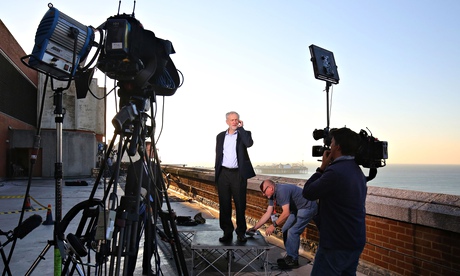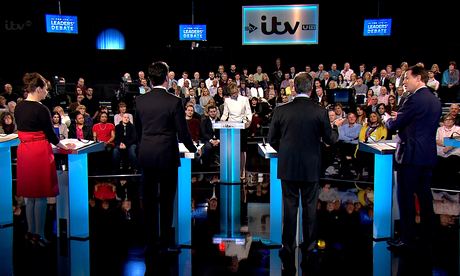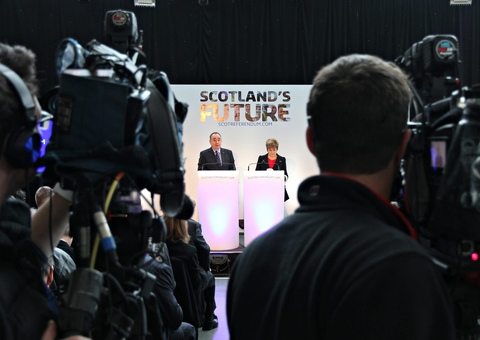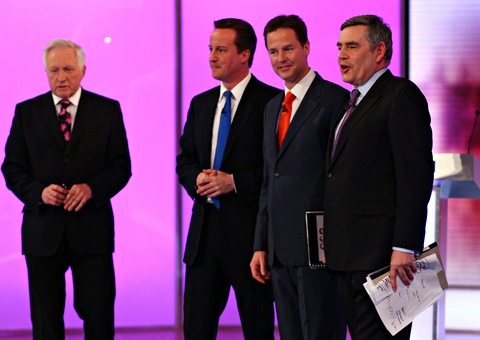As Sky News presenter Eamonn Holmes told Labour leader Jeremy Corbyn when he interviewed him last week, “You are different.”
That much was clear when, having won the election to become leader, Corbyn declined an invitation to appear on The Andrew Marr Show – opting instead for a Mental Health fun day.
“You know the way the game works,” Holmes said in his interview with Corbyn, referring to television’s coverage of politics. But the politician does not appear to be playing it.
Holmes was attacked by some on Twitter over this encounter for its slightly awkward football analogies. But the general consensus is that even other experienced broadcasters such as Andrew Marr and Sarah Montague have found Corbyn’s approach disarming, although Montague did get him to say that if he became prime minister he would not press the nuclear button.
So have the rules of engagement changed with Corbyn’s arrival on the main stage?
He has not been media-trained and a colleague of his says: “The thing about him is he’s just authentic ... he knows so much about his subject. It’s effective because people can see it’s genuine ... he just answers the question. I think the broadcasters have been kind of unhinged by it.
“Jeremy is so honest it takes them by surprise, people are so used to spin.”
Corbyn lost his temper with Channel 4 News presenter Krishnan Guru-Murthy during the Labour leadership campaign in July but they “got along pretty well after that”.
Guru-Murthy explains: “The most refreshing thing about Corbyn’s approach is that he is pretty candid, prepared to say he doesn’t know what will happen and doesn’t feel the need for everyone to agree. So he’s right to say media obsessions about shadow cabinet splits look a bit silly.
“However, if you look at the series of interviews he did at the Labour conference they were all pretty similar, so I’m not sure ‘the new politics’ are all that different to the old. He has a message he wants to get over, he’s become rather good at doing it and he doesn’t especially like the awkward questions … given how some newspapers are treating him it is no surprise his ‘kinder and caring’ approach to politics does not always extend to the media. I’m really looking forward to our next encounter. The rules of engagement should always be the same – and fair. The approach might be a bit different, but I’m not telling him in advance!”
Newsnight’s Emily Maitlis says: “Corbyn is a great politician to interview precisely because he doesn’t feel the need to stick to script. And I always feel that willingness to engage with the question and be as honest as he feels he is able comes through.”
Media training should never be encouraged, she adds, as the last thing journalists want is, “a politician who’s found yet another way to not answer a question” and audiences can tell when “a politician is parroting a line”.
She always likes to interview “a politician who [speaks] from the heart” but wonders, “how long authenticity and effective leadership can co-exist”.
Sky News political editor Faisal Islam interviewed Corbyn during the leadership campaign and says that while the other candidates answered the questions in the same way, he was prepared to really address them and did not resort to 30-second soundbites: “It was a genuinely different experience.”
Islam says such authenticity is at a “premium” in the modern age when many viewers do not trust politicians, pointing out that Corbyn has frequently admitted he does not know the answers to some questions.
ITN’s Mark Austin, Royal Television Society presenter of the year, says that with Corbyn, “the rules of engagement remain largely the same. Yes he’s a different sort of politician promoting a different sort of politics but even that needs challenging and testing.”
So, going back to brass tacks, what are the secrets to the art of political interviewing? All the journalists I interviewed said doing their job was a privilege and that listening and research are key.
“You may have to repeat or interrupt when it is clear the politician isn’t answering your question,” says Guru-Murthy. “If you are holding them to account for something that has gone wrong, you have to have the facts at your fingertips to counter whatever defence they have come on with.
“If it is clear they have a heavily rehearsed line,” he adds, “you must hit them with questioning they haven’t thought of. But if you use the same tack with everyone, you will soon become predictable in an age where politicians generally prepare with advisers what they’re going to say. So the secret is also surprise.”
Maitlis, whose brilliant quizzing of shadow chancellor Ed Balls showed up his inability to remember the name of one of the party’s key supporters, explains: “It sounds really obvious but you have to go in knowing what you want to find out. Sometimes the thing is very specific, ‘How much support does Labour have in the business community right now?’. Sometimes it’s much more general.
“The worst interviews are the rambling ones when you sort of have a list of questions but none of them really dovetails and you end up thinking you know as little afterwards as you did before.
“The most crucial thing is to listen. Sometimes you miss an amazing turning point because your mind was racing ahead to … your next question … instead of being in the present with them [with] what they are saying.”
According to Austin the secret “is persistence, whether gentle or more aggressive, if necessary. So often politicians will have a message they want to get over but that should never be at the expense of getting an answer to the question the interviewer has posed. You also, in my view, need to be impartial and apply the same standards of rigour to politicians of all parties.”
Islam reckons that you, “have to remember the political narrative is a fairytale. Our job is not to convey their narrative”, but to test it and see if it is robust and truthful. He warns that the arrival of other platforms such as Facebook where voters can answer questions directly means interviewers have to add, “journalistic value”.
The parties have tried to exert as much control as they can, says Islam, with some set-pieces on trips to factories that “have a faint whiff of North Korea about them”. But he reckons the greater digital space has made audiences keener for longer form pieces of journalism. And that, at the moment, may favour Corbyn’s style.











